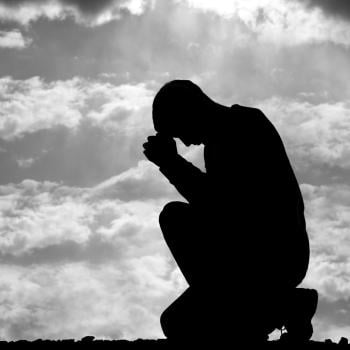
Humility is important. We can and should be self-critical, but we should not be so self-critical that we end up hating ourselves, incapable of seeing how and why God loves us. We need to be honest with ourselves. We need to accept our imperfections, for then, when we strive to move beyond them, we will be able to accept our need for God’s grace to do so. We must not think we can do it all by ourselves. We should also realize that transformation takes time, and struggle on our part; we must cooperate with grace, allowing it to work in and with us to change us from within. Our goal should be perfection, that is, becoming what God intended us to be in accordance to the nature we have been given; we should also understand that, for most of us, we will not attain such perfection in our temporal existence. If we do not, we will find ourselves continuing our transformation after our death, until, at least, we find ourselves not only attaining our natural perfection, but transcending it in eternity.
We should, likewise, contemplate our relationship with God. We must try to discern how God is always at work in and with us, so that with such discernment, all our actions can and will reflect our relationship with God. Our whole lives can be seen to be one long prayer to God. This means that different aspects of our lives can and will represent different ways by which we manifest that prayer. Sometimes, we will be thanking God for all the great things we have been given in our lives, sometimes we will be pleading to God for help, and sometimes we will be asking God questions, sharing with God all our doubts. Sometimes, we will be silent, hoping for God to manifest the divine presence to us. And finally, sometimes, we will pray through our actions, understanding that in such times, our actions can be said to speak louder than words.
How we end up praying in a given moment will depend upon the way things are going in our lives; often, our prayer will be more implicit than explicit, as we do not have the time for quiet contemplation or other spiritual practices. What is important is for us to find a way to have all that we do in our lives be seen as a part of one great life-long prayer. Everyone will have a different vocation in life, and so a different life-long prayer they offer to God. Thus, when we read various desert fathers and mothers talking about their own lives, and the ways they engage God, we should understand they were revealing to us something about themselves with the hope that those who listen to then will be able to find something they can apply to their own lives. Take, for example, Abba Poemen and what he told us about his own daily routine:
Abba Poemen said: ‘There are three mysteries before when I meditate: that I should pray to God all the time, without respite; that I should place [the vision of] my death before me all the time; and that I should [bear in mind] that, when I am dead, they will throw me into the fire on account of my sins.’[1]
Poemen shows us three basic aspects of his life, so that through them, we can be encouraged to follow his examples, adapting them to fit our own lives.
First, he pointed out he prayed without ceasing, which of course, is something St. Paul also suggested, but what that prayer is – as mentioned above – will differ from person to person, and can and will change throughout the day. We should not expect our prayer to be never-changing, but rather, we should expect it to change from day to day because our lives are constantly changing.
Secondly, Poemen reminds us that our time in the world is temporary: we will eventually die. We should not take this to mean we will be annihilated from existence, but rather, our mode of existence will change as we will find, at death, that we will enter into eternity and no longer be bound by time. Keeping this in mind will help us relativize the goods of temporal being, including positions of honor or power, or the wealth that we might accumulate: they will not last, and so we should not treat them as anything but temporary goods (at best). We can use them, we can find the good in them, we can even enjoy them, but we must keep in mind that we will go from temporal to eternal existence and our character, and how we develop ourselves in time will be what comes with us into eternity. The way we use those goods will be a part of that character, which is why we should make sure our engagement with them is good and just, so that we develop the kind of justice in our soul we want with us into eternity. If we abuse them, if we use them in a wicked fashion, if we exploit them or others through them, we will find our character will represent the injustices we have embraced, and our experience of eternity will reflect that degenerate character we have established for ourselves.
Finally, to help us keep in mind our eternal destiny, we should reflect upon how we have engaged our time, and indeed, how we have abused it, neglecting the good which we can and should do while enjoying the gifts which we have been given to enjoy. That is, we should admit our mistakes, our need for grace, and indeed, our need for purification. But we should do so with hope, knowing that if before we die, we are not pure of heart, we will continue to have the opportunity to change as we will be led to the fiery love of God, the fire which will eat away and eliminate all that is impure.
Proper, not false, humility helps prepare ourselves for eternity, as it allows us to admit our mistakes and our need for transformation. It also allows us to accept the good which we have within us, which is very important, for when we accept that good, we accept that we can be loved by God, and through that love, even accept that we can enjoy the life we have been given without fear that in doing so we somehow turn ourselves away from what God wants us to do. We are to be humble, not hate ourselves. Life is a good. Contemplating eternal life should not have us neglect the good of temporal life and the opportunities we have in it. This, sometimes, is what Christians have forgotten, as they often think about eternity in such a way they do not know how to embrace the present moment and the good which is found in it. Humility reminds us to accept the good in the moment, so that in and through it, then, we will be able to find every moment as a gift given to us from God, and when we do that, then we can truly understand how we can make our life a life-long prayer to God instead of nihilistically denying ourselves and the good found in the time we have been given.
[1] More Sayings of the Desert Fathers. An English Translation And Notes. Ed. John Wortley (Cambridge: Cambridge University Press, 2019; repr. 2023), 156 [“Sayings Preserved in Ethiopic”: E46].
Stay in touch! Like A Little Bit of Nothing on Facebook.
If you liked what you read, please consider sharing it with your friends and family!
N.B.: While I read comments to moderate them, I rarely respond to them. If I don’t respond to your comment directly, don’t assume I am unthankful for it. I appreciate it. But I want readers to feel free to ask questions, and hopefully, dialogue with each other. I have shared what I wanted to say, though some responses will get a brief reply by me, or, if I find it interesting and something I can engage fully, as the foundation for another post. I have had many posts inspired or improved upon thanks to my readers.













